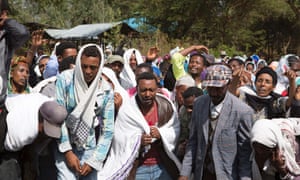Bid to expand capital into nearby farms abandoned but protesters say Oromo people’s struggle for equality continues

Ethiopia has announced it will scrap plans to expand the capital into surrounding farms after widespread opposition from the public.
Clashes are thought to have claimed 140 lives as students and farmers from the Oromia region marched against the so-called “master plan” to allow Addis Ababa to subsume nearby farmland.
In a televised statement on Wednesday, the Oromia branch of the ruling EPRDF party announced the plan had been “scrapped” after discussions with local residents.
In the statement, the government said it had “huge respect” for the Oromo people who opposed the master plan.
But the statement downplayed the reasons for the opposition, saying it was based on a simple misunderstanding created by a “lack of transparency”.
Reaction
The announcement was met with derision by activists in Ethiopia and in the diaspora.
“I am afraid this is too little too late,” said Kebede, a university student in Ambo town who declined to give his last name.
“I want to say to the regime that if they want to [present] our long-standing grievances [as] a simple misunderstanding and lack of transparency, the protest will only continue.”
Birhanu Lenjiso, an Ethiopian researcher based in the Netherlands, said the issue exposed wider problems with how the ruling elite treat the Oromo people, the country’s largest ethnic group.
“The Oromo have economic rights, the right to land, the right to decide on their own development, the right to decide their own resources,” he said.
“You can defy these questions for some time, but you cannot defy them forever,” he added, suggesting the latest move would a short-term fix for a more intractable issue.
Though the recent protests were triggered by the expansion plans, activists say there are long-standing grievances about the disproportionate distribution of power and wealth towards Tigray elites, predominantly from the north of the country.
Moments after the televised statement, Jawar Mohamed, a prominent opposition figure in the Ethiopian diaspora, said the concession was a success for protesters but would not be the end of the dispute.
“These concessions are not voluntary gifts from the ruling party but hard fought victory achieved through sacrifices of the daughters and sons of the Great Oromo Nation,” he wrote on Facebook.
“The Oromo people cannot take today’s announcement as lasting solution to their to freedom from eviction, systematic exclusion and mass incarceration. Just as we achieved these concession through our struggle, we must step up to force their practical implementation.”
Protests in some Oromia towns continued on Wednesday evening despite the announcement.
Reports from Ambo, west of Addis Ababa, suggested violence clashes had been continuing.
Elsewhere, activists said peaceful demonstrations and sit-ins were taking place in schools across the Oromia region.


No comments:
Post a Comment